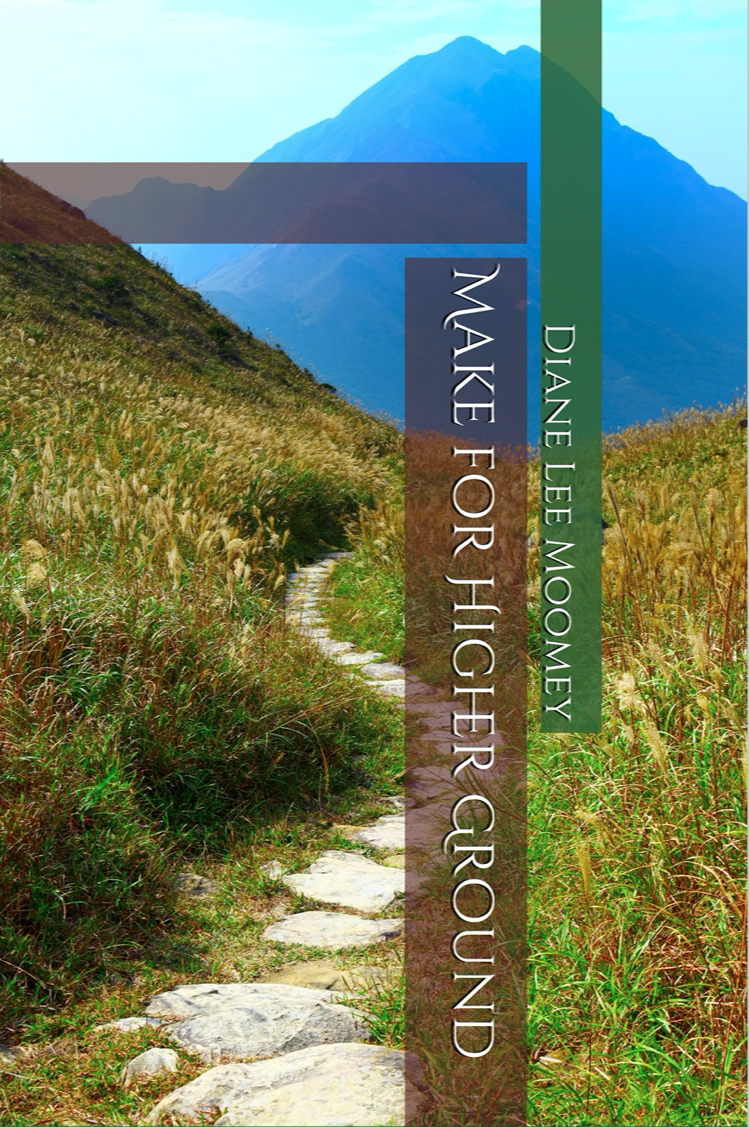 Reviewed by Laura Schulkind
Reviewed by Laura Schulkind
Make For Higher Ground
by Diane Lee Moomey
Barefood Muse Press
Aug 21, Paperback, ISBN: 979-8509619205, 77 pages
Diane Lee Moomey is one of those masterful form poets who uses structure to challenge boundaries. Her new collection, Make for Higher Ground, does just that. Throughout, it is evident she has drawn on I Ching #57, Penetrating Influence, which she speaks of in the introduction and riffs on in the opening poem, as the collection both offers us a path to higher ground, and persistently urges us to take it.
Her path begins with “Small Wild Things”, a group of poems that leads us into the “tall red grasses” that lie just beyond the road. She finds sleek snakes in “the long stems my father’s mower doesn’t/reach” (Wearing Snakes); and imagines wild cats in the forest abutting the golf green (Time Share at the Country Club). In juxtaposing human activity and wildness, she urges that we not forget our connection to the wild—even as we mow and drive and golf and stay indoors with the radio blaring. As she concludes in Chaparral, just knowing “. . .the wild/ is out there. Sometimes/that’s all you need.”
From there, she takes us to our beginnings in a section titled “Tap Roots”— suggesting we can’t get much of anywhere without understanding our origins. “I’d open trunks and boxes, pry;/so certain that I’d found the place/where all the family secrets lie.” (The Other Attic). The intimate details of these poems (the “wicker chair with yellow chintz/ that curved to her fit”—Her Screen Porch) also convey a loving eye—reminding us that we can cherish where we came from without getting trapped there. In her exquisite poem, Carousel, she considers her own mother’s choices, and in so doing perhaps explains her own: “You could get off. You may have wanted something/else: the purple unicorn . . .”
Now grounded, the book offers us Fractals, a series of poems on how to navigate a dangerous world. Here we find perfectly placed at the middle of the book, Water Above Water Below, (a riff on I Ching #29—Danger), which gives us these final lines: “The lamps are going out, dear/one by precious one and it’s for us/to choose to live in darkness or, blind/and trembling, make for higher ground/and set ourselves alight.”
Then, in the last two sections she shows the way out of the darkness. In Coming Up For Air, the poems remind us to find delight in the world we have—embrace dear friends (“I’ll squeeze Purell into my right/palm and gently stroke your left cheek”); arrange pandemic picnics; rescue “former treasures left behind” from the dollar bins.
In Lights Above the Poles she adds, and ends with, love. A gorgeous collection full of sky and light, these poems tell stories that remember, long for, miss and sustain love. Importantly, there is nothing saccharin here. Indeed, the last poem ends ominously, “Making coffee, breaking camp—/we do this well together,/but whitecaps, winds and lowered skies; promise heavy weather.” And that’s the point. Higher ground is not a panacea; it isn’t even a place. It is a way of being in the world that Moomey gently urges in this compelling collection.
About the reviewer: Laura Schulkind has two chapbooks with Finishing Line Press, Long Arc of Grief (2019) and Lost in Tall Grass (2014). Her work also appears in numerous journals, and published pieces can be found on her website, www.lauraschulkind.com.
Note: This review first appeared in Poetry Letter No. 4, 2021 of the California State Poetry Society